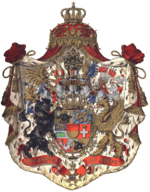House of Mecklenburg-Strelitz
| House of Mecklenburg | |
|---|---|
 |
|
| Country | Mecklenburg |
| Titles | Duke |
| Founded | 1167 |
| Founder | Pribislav |
| Final ruler |
Frederick Francis IV (Schwerin) Adolphus Frederick VI (Strelitz) |
| Current head | Duke Borwin (Strelitz branch) |
| Deposition | 1918 |
The House of Mecklenburg, also known as Nikloting, is a North German dynasty that ruled until 1918 in the Mecklenburg region, being among the longest-ruling families of Europe.
The family was established by Pribislav, an Obotrite (Slavic) prince who converted to Christianity and accepted the suzerainty of Saxon Duke Henry the Lion (r. 1142–1180), his fallen father's enemy, and became the Lord of Mecklenburg (derived from Mikla Burg, "big fortress", their main fortress). The Obotrites were subsequently Germanized. The main branch of the house was elevated in 1347 to ducal rank.
Mecklenburg
Mecklenburg-Güstrow
Mecklenburg-Schwerin
Mecklenburg-Strelitz
The Dukes of Mecklenburg pursued from the 14th century a claim to inheritance in Sweden. The Duke of Mecklenburg was a descendant and the heir of two women whom legends tied to Scandinavian royal houses.
The Sverker dynasty had long been extinct, having lost the throne ultimately to Eric XI. The male dynasty of Eric X was already extinct, and issue of his other daughters had been sidestepped by Birger Jarl, the husband of his daughter (the only one still alive in 1250), Ingeborg Eriksdotter of Sweden. Birger took great care to secure the kingship for his own sons.
The Dukes of Mecklenburg's claim to the Swedish throne became reality during a brief reign: Henry II's son Albert II, Duke of Mecklenburg (1318–79), married a kinswoman, a Scandinavian heiress named Euphemia of Sweden and Norway (born 1317 and died 1370). The couple's second son duke Albert III deposed his uncle from the Swedish throne, and ascended as king.
...
Wikipedia
